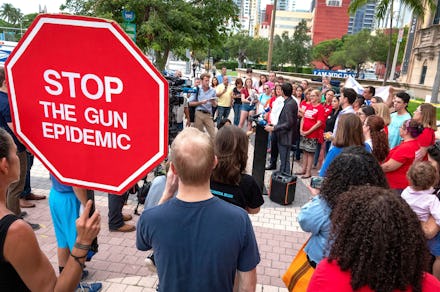Congress just agreed to put $25 million toward gun violence research

Mass shootings in the United States have become so common, it's difficult to keep track of each one. The topic remains a polarizing political issue, but this week gun control advocates can notch a rare win: For the first time in two decades, Congress may fund gun violence research. Although the deal isn't complete yet, anti-gun violence activists say it's a major achievement.
On Monday, congressional negotiators finalized a $1.3 trillion federal spending deal. Under that deal, $25 million would be split between the Centers for Disease Control and Prevention and the National Institute of Health to study gun violence. If the deal passes, this would be the first time that the U.S. federal government funded gun violence research since the 1990s.
Part of why there hasn't been any funding like this before is the 1996 Dickey Amendment. This provision says that funding for injury prevention and control at the CDC cannot be used to "advocate or promote gun control." There's nothing explicitly stopping Congress from funding gun violence research — but that's pretty much what has happened.
The spending deal still has to get passed by Congress and be signed into law by President Trump, but some members of Congress are already celebrating. "The power of the gun violence prevention movement is now unmistakable," tweeted Sen. Chris Murphy (D-Conn.), who took office shortly after the Sandy Hook shooting.
In the past year alone, mass shootings like the ones in El Paso, Texas, and Dayton, Ohio, have left over 50 people dead. These shootings aren't out of place, but rather have become something of a disturbing norm.
The four deadliest U.S. mass shootings all occurred in the last decade. In 2017, the Gun Violence Archive, a nonprofit research group, revealed that a mass shooting occurred nine out of every ten days on average. Overall, gun violence accounted for 39,773 deaths in 2017, according to the CDC. That made guns deadlier than car accidents.
Republicans have constantly called for guns to not be politicized. However, recent shootings with blatant links to white supremacist ideology means that it's increasingly difficult to pretend that gun violence can be separated from politics .
"While some think this shouldn’t be a political issue, it is. It is because the killers are telling us it’s political in their manifestos," Michael Fuchs, a senior fellow at the Center for American Progress, wrote in The Guardian.
If this spending bill passes, it won't dedicate as much money to the issue as Democrats originally wanted. According to The Washington Post, the funding is $50 million less than what Democrats requested, and much less than funding that goes towards other areas of research.
It is still a victory, though. There are plenty of individuals and families who can speak to the impact that gun violence has had on their lives, but sometimes research is all that people will listen to.